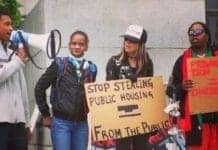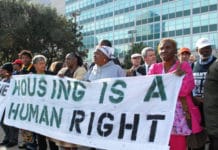HUD’s far-right policy would privatize 1.2 million public housing units
by Lynda Carson
 In a stunning move that targets the poor, the Obama administration is pushing hard to privatize our nation’s 1.2 million public housing units, in addition to proposing a radical change to the way 13 major federal subsidized housing programs, including the Section 8 voucher program, are being funded by Congress. HUD assists over 4.5 million low-income residents in the nation’s housing programs.
In a stunning move that targets the poor, the Obama administration is pushing hard to privatize our nation’s 1.2 million public housing units, in addition to proposing a radical change to the way 13 major federal subsidized housing programs, including the Section 8 voucher program, are being funded by Congress. HUD assists over 4.5 million low-income residents in the nation’s housing programs.
The Department of Housing and Urban Development (HUD) has submitted legislation to Congress known as the “Transforming Rental Assistance” (TRA) initiative, under a policy proposal called the Preservation, Enhancement and Transformation of Rental Assistance Act of 2010 (PETRA).
If enacted as proposed, HUD’s proposal would allow over 3,000 public housing agencies to privatize around 1.2 million public housing units across the nation, and HUD’s additional 13 federal subsidized housing programs would all be converted into one huge new hybrid program, subsidized through only one funding source.
 Currently, public housing and each of the 13 federal housing programs including the Section 8 voucher program, has its own budget and funding stream allotted every year by Congress. The separate funding streams help to ensure that the money reaches those it was intended to serve.
Currently, public housing and each of the 13 federal housing programs including the Section 8 voucher program, has its own budget and funding stream allotted every year by Congress. The separate funding streams help to ensure that the money reaches those it was intended to serve.
But under TRA, with the funding streams for all subsidized housing programs combined into one huge slush fund, the public would not be able to determine whether future funding shortfalls would affect AIDS patients, the elderly, the chronically ill, the disabled or other low-income households in the programs.
Additionally, under HUD’s TRA proposal, public housing residents would be placed at risk of displacement and homelessness because public housing would become privatized and would no longer receive federal funding from Congress for capital improvements and operating costs.
Instead, under TRA, the newly privatized units would rely on higher than market rate rents that will be subsidized by taxpayers through the Section 8 program. The funds being grabbed from the poor in the Section 8 program that will be used for the public housing privatization scheme will leverage financing for building improvements from lending institutions and banks.
If enacted as proposed, the TRA proposal would drain much needed funding from the poor in the Section 8 program, causing Section 8 tenants to pay higher rents, and would place the nation’s 1.2 million units of public housing at risk of foreclosure when funding shortfalls occur in the Section 8 program, which has happened quite often through the years. Currently, 10,000 Section 8 voucher holders are at risk of losing their vouchers in New York City, due to funding shortfalls in their program.
Housing advocates spoke out at a congressional hearing on May 25 and are urging the public to contact their representatives to say, “No on TRA.”
“What happens to public housing in the event of a foreclosure or bankruptcy,” Los Angeles Congresswoman Maxine Waters asked HUD Secretary Shaun Donovan at the hearing. “Right now we are in the middle of the worst foreclosure crisis this country has ever experienced,” she said. “While the foreclosure of one home may be a tragedy, it is an event that only affects one family. The foreclosure of a public housing development would have a devastating impact for dozens – and in some cases – hundreds of families.”
You can help by signing a petition in opposition to TRA at http://www.gopetition.com/petitions/save-public-housing.html.
Lynda Carson may be reached at tenantsrule@yahoo.com.

 Store
Store












